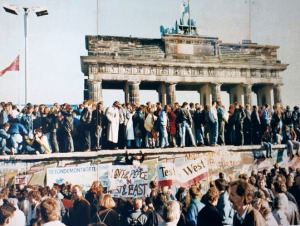25 Years Since the Fall of the Wall
Last week, Germany marked the 25th anniversary of the fall of the Berlin Wall. Chancellor Angela Merkel, who grew up in East Germany, led the country in celebrations with a 20-minute speech and the opening of a museum at the site of one of the few surviving sections of the Wall. The celebration’s highlight was the “Lichtgrenze”, a chain of lights comprised of 7,000 helium balloons placed nine miles along the former path of the Berlin Wall. The balloons were released into the sky during a performance of the Staatskapelle Berlin orchestra at the historic Brandenburg Gate.
East Germany, hoping to restrict the flow of refugees to the West, erected the wall before dawn on August 13, 1961. The Berlin Wall divided the city for the next 28 years.
Although the barrier only divided the city, it also became a potent symbol of the division between East and West during the Cold War.
On November 9, 1989, tens of thousands of Germans tore down the wall, using their hands or whatever tools their hands could find. The East German government then tore down larger portions of it by crane. The stream of citizens moving west that day marks the beginning of the German reunification and the conclusion of the Cold War. The fall of the Berlin Wall is a pivotal moment on the international stage and marks the start of the rise of Germany as a major power of Europe and the world.
Germany’s rise is remarkable considering its position 25 years ago. Berlin, bombed to ruins during World War II, now enjoys renown as the capital of a true world power. The success of Germany is in part due to its ability to take advantage of the opportunities presented to it following the fall of the wall.
The first opportunity presented to the Germanys was reunification. In the eastern part of Germany and in many other Soviet-bloc countries, Western Germans found legacies of Soviet rule: high unemployment and low productivity. However, this supplied a relatively low-cost workforce and offered new markets with a hunger for products. German businesses capitalized on the situation and in the process gained valuable understanding of foreign markets. This knowledge served it well when the expansion of the European Union presented another opportunity for Germany. The German economy by no means limited itself to Europe; the nation became involved in emerging Asian markets, particularly those of India and China.
As a result, Germany is now one of the world’s largest exporters. It enjoys a position as the world’s fourth largest economy and as the key economic power in the European Union. Germany’s 5.0% unemployment rate is the lowest in the European Union. For comparison, the European Union unemployment rate was 10.1% in September.
The German economy has also proved to be more resilient than that of the larger European Union. Although the country was initially hit hard by the financial crisis of 2008, it was able to rebound with the help of its exports by 2010. In May of the same year, Germany’s parliament approved a 22.4 billion euro German contribution to bail out Greece. The German position as the protector of the European Monetary Union illustrates the enormous shift in power the country has experienced in the past 25 years.
The anniversary of the fall of the Berlin Wall highlights the fresh challenges facing Germany and the European Union. During the celebrations on Sunday, former Soviet leader Mikhail Gorbachev gave a speech in Berlin. Gorbachev, who is widely credited for paving the way for the Wall's collapse, warned of a potential new Cold War in light of the nearby Ukraine crisis.
Germany must also fight complacency at home. Although the German economy recovered from the economic crisis quickly, it experienced large fluctuations due to its export-heavy economy. To avoid future economic instability, Germany must shift its economy away from dependency on exports. A shift away from exports is particularly crucial as demand gradually slows in China and other emerging markets. The vestiges of the Berlin Wall’s divide issue yet another challenge to Germany. The legacy of the separation persists through an East-West wealth gap and unemployment figures, which are nearly twice as high in the East.
Germany’s relationship with the world has evolved rapidly in the past 25 years, from a divided and broken state to an economic powerhouse. However, Germany should be careful to maintain its position and continue the mending process at home.

